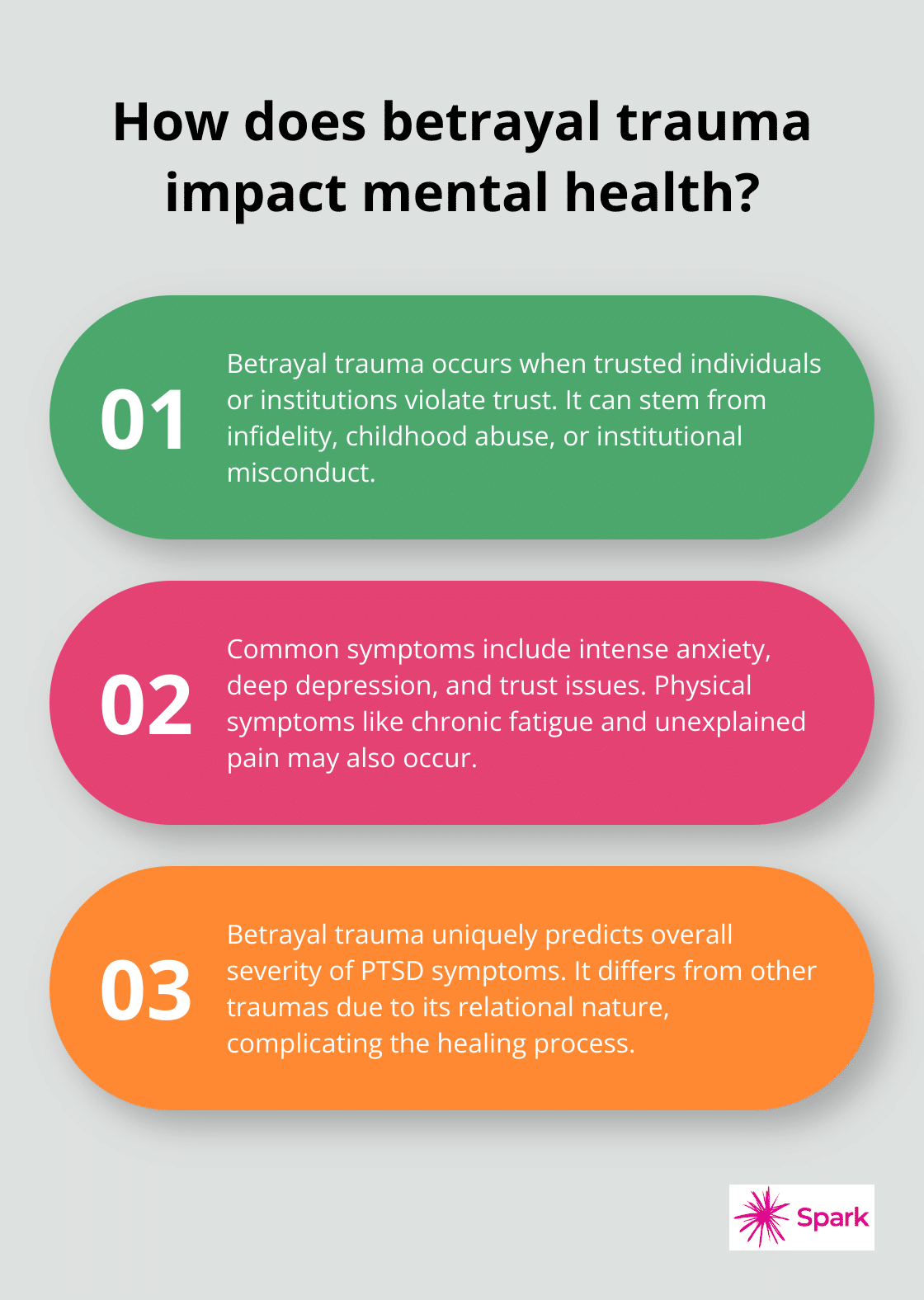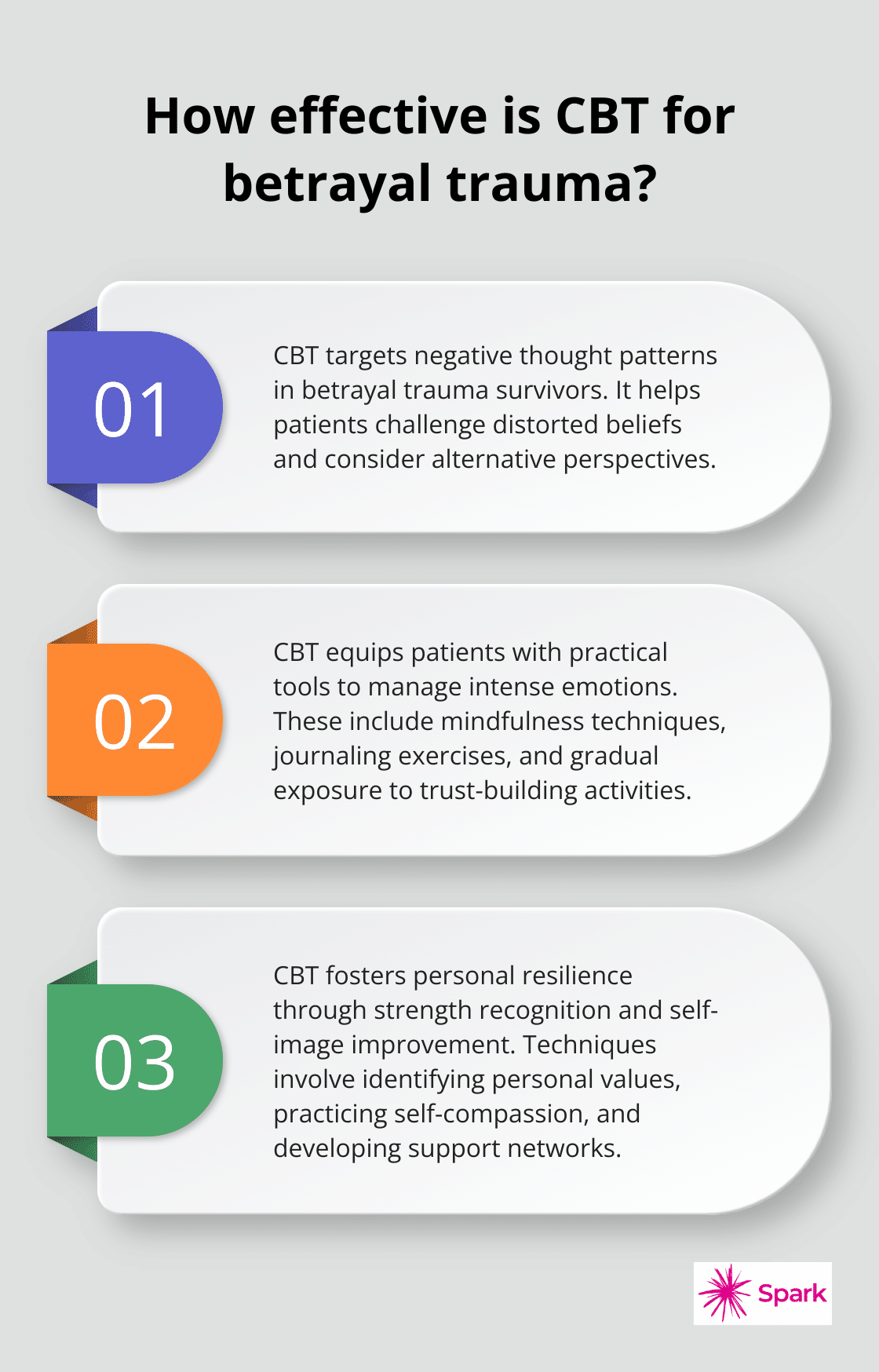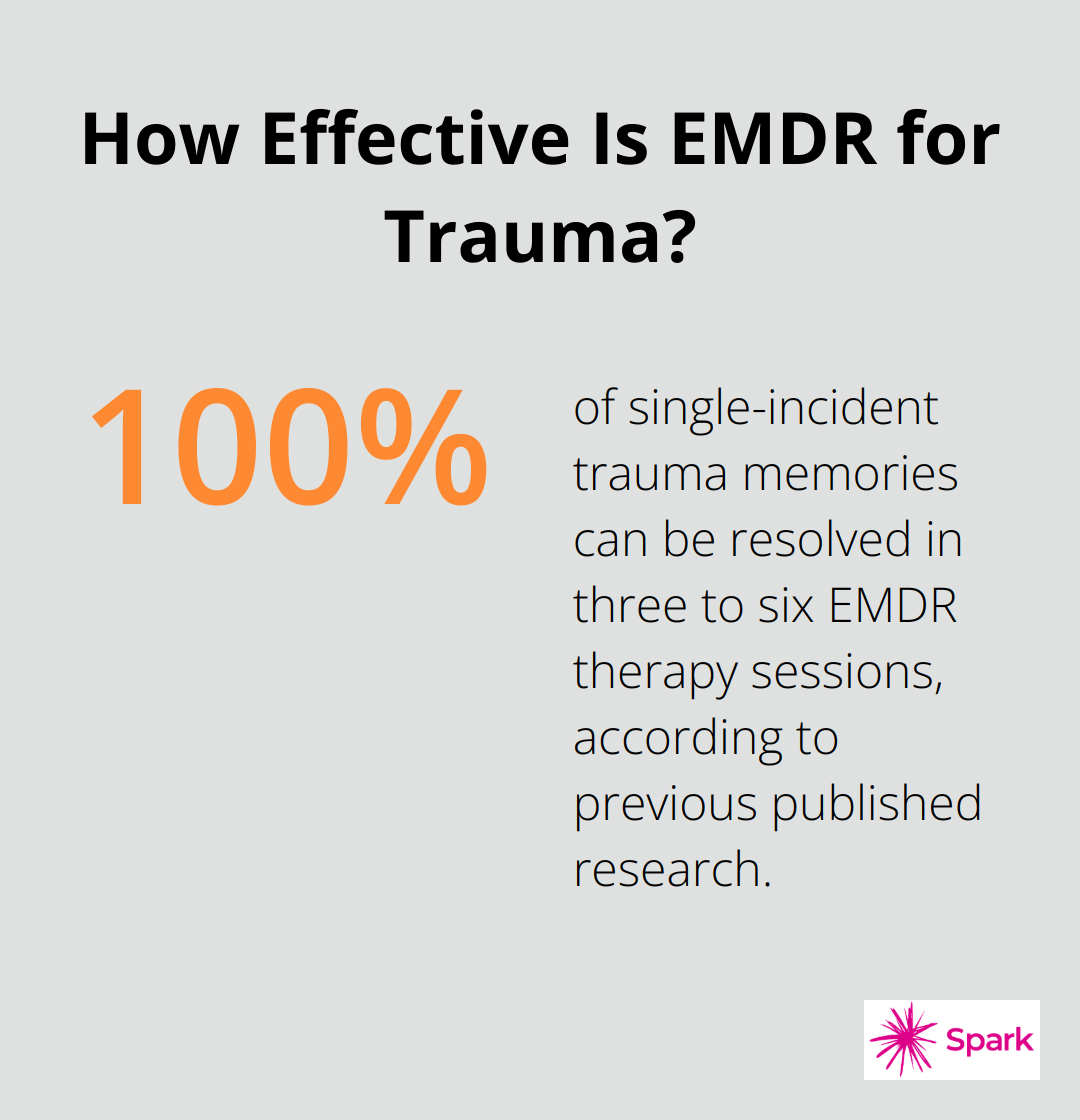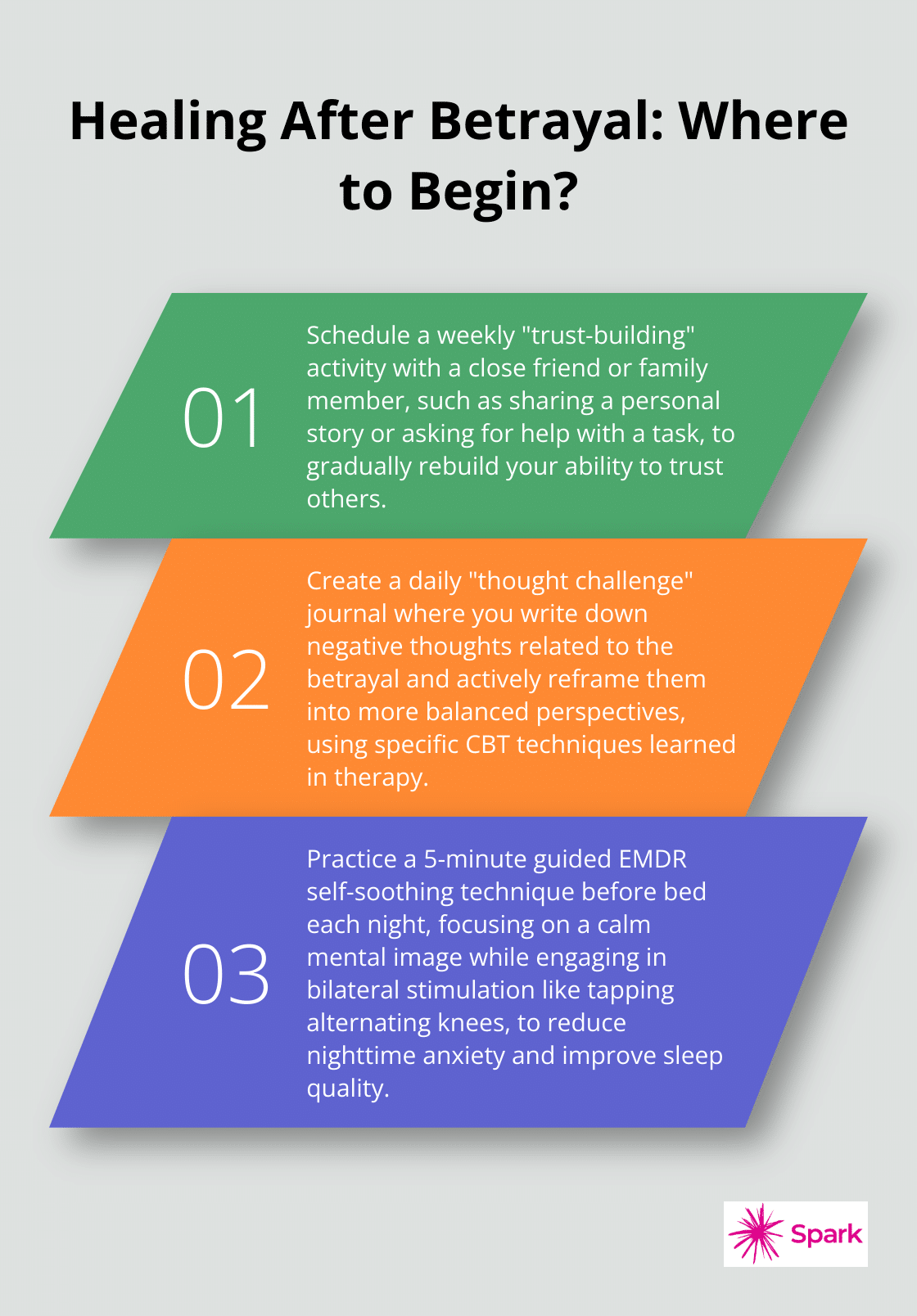Betrayal trauma can shatter trust and leave deep emotional scars. At Spark Mental Health, we understand the complex nature of this unique form of psychological injury.
In this post, we’ll explore effective betrayal trauma therapy approaches that can help survivors heal and rebuild their lives. From Cognitive Behavioral Therapy to Eye Movement Desensitization and Reprocessing, we’ll discuss powerful tools for recovery and growth.
Understanding Betrayal Trauma
Definition and Origins of Betrayal Trauma
Betrayal trauma occurs when a person or institution we deeply trust violates that trust, causing significant psychological harm. This form of trauma can stem from various sources, including infidelity, childhood abuse, or institutional misconduct. The betrayal aspect intensifies the trauma, as it shatters fundamental beliefs about safety and relationships.
The Profound Impact on Mental Health
The effects of betrayal trauma can be severe and far-reaching. Common symptoms include:
- Intense anxiety and hypervigilance
- Deep depression and feelings of worthlessness
- Trust issues in forming new relationships
- Intrusive thoughts and flashbacks about the betrayal
- Physical symptoms (e.g., chronic fatigue, unexplained pain)
Research has shown that the experience of betrayal during a trauma is uniquely predictive of overall severity of PTSD symptoms, PTSD-related avoidance, and other related issues.
Distinguishing Betrayal Trauma from Other Forms
Betrayal trauma differs from other trauma types due to its relational nature. While events like car accidents or natural disasters can be traumatic, betrayal trauma strikes at the core of our ability to trust and connect with others. This relational aspect often complicates the healing process.

For instance, a person who experienced childhood neglect might struggle not only with the original trauma but also with forming healthy attachments in adulthood. This illustrates how betrayal trauma can create a ripple effect, impacting various aspects of a person’s life long after the initial event.
Identifying the Signs of Betrayal Trauma
Recognizing betrayal trauma is essential for effective treatment. Key indicators include:
- Emotional numbness or disconnection from others
- Intense mood swings or emotional outbursts
- Self-blame or shame
- Difficulty in decision-making or trusting one’s judgment
If you or someone you know exhibits these signs, seeking professional help is vital. Many mental health providers (including Spark Mental Health) offer specialized care tailored to address the unique challenges of betrayal trauma, providing a path towards healing and rebuilding trust.
As we move forward, we’ll explore specific therapeutic approaches that have proven effective in treating betrayal trauma, starting with Cognitive Behavioral Therapy (CBT).
How CBT Heals Betrayal Trauma
Rewiring Thought Patterns
Betrayal trauma therapy can provide tools and strategies for recovery and allow you to mitigate or reverse undesirable effects. Cognitive Behavioral Therapy (CBT) targets the negative thought patterns that often plague survivors of betrayal trauma. CBT therapists help patients identify and challenge distorted beliefs. For instance, a patient might initially think, “I’m unlovable, that’s why I was betrayed.” Through CBT, they learn to question this thought and consider alternative perspectives like, “The betrayal reflects the other person’s choices, not my worth.”
Building Effective Coping Strategies
CBT equips patients with practical tools to manage the intense emotions associated with betrayal trauma. These strategies include:
- Mindfulness techniques to stay grounded during flashbacks or anxiety attacks
- Journaling exercises to process emotions and track progress
- Gradual exposure to trust-building activities in safe environments
A study found that variations of cognitive behavioral therapy (CBT) effectively treat PTSD, although non-response rates and dropout rates remain relatively high.
Fostering Personal Resilience
Resilience-building forms a key component of CBT for betrayal trauma. This process helps patients recognize their strengths and develop a more positive self-image. Techniques often include:
- Identifying personal values and setting aligned goals
- Practicing self-compassion exercises
- Developing a support network and improving communication skills
Practical Application in Daily Life
CBT extends beyond therapy sessions into patients’ daily lives. Patients apply what they learn through activities such as:
- Keeping a thought diary to track and challenge negative thoughts
- Practicing relaxation techniques during stressful situations
- Gradually engaging in social activities to rebuild trust in relationships

Many therapists (including those at Spark Mental Health) work closely with patients to tailor CBT techniques to their specific needs and experiences with betrayal trauma. This personalized approach often leads to more effective and lasting healing.
Combining CBT with Other Approaches
While CBT proves highly effective, healing from betrayal trauma requires patience and consistency. Many patients find that combining CBT with other therapeutic approaches provides comprehensive healing. One such approach, Eye Movement Desensitization and Reprocessing (EMDR), offers another powerful tool in the treatment of betrayal trauma. Let’s explore how EMDR complements CBT in the next section.
EMDR Therapy for Betrayal Trauma
Understanding EMDR
EMDR therapy provides a potent approach to heal from betrayal trauma. This innovative treatment method targets the emotional distress linked to traumatic memories, helping patients process and integrate these experiences. Research suggests that EMDR therapy can lead to significant improvements in overall well-being and quality of life for individuals dealing with betrayal trauma.
The EMDR Process
EMDR therapy consists of a structured eight-phase treatment. During sessions, patients focus on traumatic memories while simultaneously engaging in bilateral stimulation (typically through guided eye movements). This dual-attention process helps the brain reprocess traumatic memories, reducing their emotional impact.

For betrayal trauma survivors, EMDR can effectively address intrusive thoughts, flashbacks, and negative self-beliefs stemming from the betrayal. A therapist might guide a patient to recall a specific instance of betrayal while following a moving light or sound, allowing the brain to reprocess the memory in a less distressing way.
Tailoring EMDR for Betrayal Trauma
When treating betrayal trauma with EMDR, therapists often focus on three key areas:
- Processing the betrayal event itself
- Addressing negative self-beliefs that developed due to the betrayal
- Building resources for future resilience
For example, a patient might work on processing the moment they discovered their partner’s infidelity, then address the resulting belief that they are unlovable, and finally develop strategies for trusting in future relationships.
Measurable Outcomes
Research supports the effectiveness of EMDR for trauma-related disorders. Previous published research indicates that EMDR therapy can resolve a single-incident trauma memory in three to-six sessions 77–100% of the time. While this study focused on various types of trauma, the principles may apply to betrayal trauma as well.
Combining EMDR with Other Approaches
EMDR can yield excellent results on its own, but many mental health professionals find that combining it with other therapies produces the best outcomes for betrayal trauma. For instance, using EMDR to process traumatic memories in conjunction with CBT techniques for managing day-to-day symptoms can provide comprehensive healing.
Different approaches may work better for different individuals in healing from betrayal trauma. Additional therapeutic strategies can complement EMDR and CBT in the treatment of betrayal trauma (such as narrative therapy or somatic experiencing).
Final Thoughts
Betrayal trauma can inflict deep emotional wounds, but effective therapy approaches offer hope for healing and recovery. Cognitive Behavioral Therapy and Eye Movement Desensitization and Reprocessing provide powerful tools to process traumatic memories, challenge negative thought patterns, and rebuild trust. These evidence-based methods can address the unique challenges of betrayal trauma, paving the way for resilience and renewed self-worth.

Healing from betrayal trauma requires patience, support, and professional guidance. Seeking help from qualified mental health professionals who specialize in trauma therapy marks an essential step towards recovery. These experts can create personalized treatment plans that address individual needs and experiences (including betrayal trauma therapy).
At Spark Mental Health, we offer comprehensive telepsychiatry services for various mental health conditions. Our team of experienced professionals provides evidence-based treatment, medication management, and cognitive-behavioral therapy in a flexible, accessible online format. With personalized care plans and compassionate support, we help individuals navigate the challenges of betrayal trauma and move towards a brighter future.






